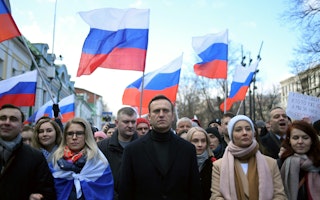Russia in 2014 has moved aggressively to reassert its authority across Eurasia and to challenge the European order established by the 1975 Helsinki Final Act. Unlike the Cold War, when nuclear warheads were the dominant factor, the chief instrument in the Kremlin’s arsenal these days is mass media. Moscow has harnessed the power of television and the Internet to mobilize domestic public opinion behind Kremlin efforts to destabilize Ukraine, and to extend Russia’s sway in Central Asia and the Caucasus. Mass media has also been instrumental in enabling Russian President Vladimir Putin to stoke a culture clash, in which basic Western concepts of justice and fairness have been cast as inimical to traditional Russian values.
Western efforts to counter the Russian narrative have themselves often resorted to Cold War stereotypes and images, further fueling the divide and myth-making. The EurasiaNet/Harriman Institute Forum, sponsored in association with the Columbia School of Journalism, will bring together a dynamic collection of journalists and academic experts, providing for a 360-degree review of pivotal issues shaping Russia’s involvement in Ukraine and its efforts to reestablish itself as a great power. The half-day event will feature two panel discussions:
Confronting the Emerging Eurasian Media Space
- Nabi Abdullaev, editor-in-chief, Moscow Times
- Andrei Soldatov, editor, Agentura.ru
- Bruce Pannier, Central Asia columnist, Radio Free Europe/Radio Liberty
The Impact of the Ukraine Crisis on Central Asia
- David Trilling, Central Asia editor, EurasiaNet.org
- Erica Marat, National Defense University
- Sebastian Peyrouse, George Washington University
- Edward Schatz, University of Toronto
Read more
Racial Discrimination
A Community Rallies Against Racial Discrimination in Denmark

When Denmark’s housing policies used racial discrimination to upend their community, local residents looked to the law to fight back. Now their six-year legal challenge is before the European Union’s top court in Luxembourg.
Evidence for Accountability
Q&A: How Open Source Evidence Is Challenging Abuses, Atrocities, and Disinformation

Bellingcat has pioneered the use of open-source research to expose human rights abuses, atrocity crimes, and high-level corruption and other criminal activities involving governments, gangs, and other illicit actors.
Navalny’s Legacy
Night Country: The Mysterious Death of Alexei Navalny in Putin’s Russia

Alexei Navalny’s death underscores the paradox of Russian power—that the voice of one man imprisoned and isolated in the Arctic should be such a threat.